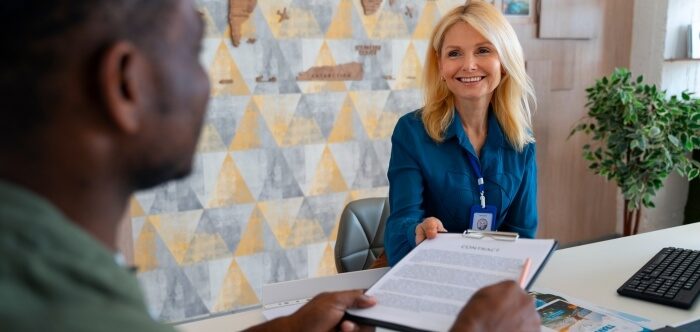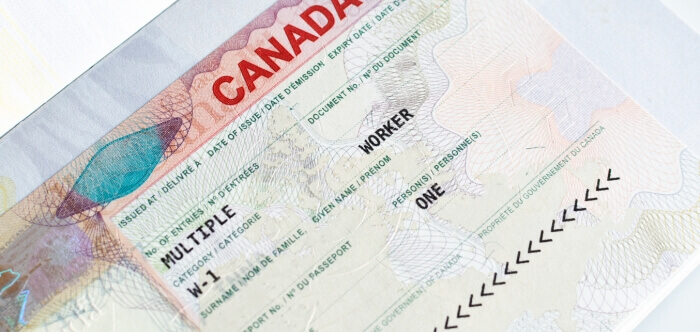When it comes to attending international conferences, the visa application process plays a crucial role in planning your trip. A question that often arises is, “Is the Canadian conference visa easier than the US visa?”
In Both countries have different immigration policies, which must be considered when answering this question. The USA primarily operates on an employment-based immigration system, requiring a work permit as a precursor to permanent residency. This implies a more complex and potentially longer process for obtaining a visa, especially for short-term events like conferences.
On the other hand, Canada is known for its more streamlined and accessible immigration procedures, hinting at a potentially easier path for obtaining a conference visa. Join us as we dive deeper into this comparison, providing you with detailed insights and guidance for your next international conference venture.
A Brief Overview of the Canadian and US Visa Processing System
International travel requires an understanding of different visa processing systems. Canada and the USA, while neighbors, have distinct approaches to their visa policies. Here’s a brief overview of how each country handles its visa processing:
In Canada, the visa application process is generally viewed as more user-friendly. The system is designed with accessibility in mind, making it especially appealing for those participating in international conferences during short-term visits. This approach contrasts with the stringent requirements often found in the US.
The US visa system leans heavily towards employment-based immigration, requiring a work permit. This method is especially relevant for those seeking long-term or permanent residency. Consequently, this can make the US visa process seem more complex and time-consuming compared to Canada’s.
Types of Conference Visas Available in Canada
Canada’s approach to welcoming international delegates for conferences is facilitated through a variety of visa types. Each visa category is tailored to specific requirements and durations of stay. Understanding these options is crucial for seamless travel planning.
Temporary Resident Visa (TRV)
The Temporary Resident Visa (TRV) is the primary option for conference attendees from countries requiring a visa. Getting a conference visa to attend Canada involves an application process that includes proving the purpose of the visit and demonstrating ties to the home country. The TRV allows for a short-term stay, typically just for the duration of the conference, making it ideal for those without plans for an extended stay.
Electronic Travel Authorization (eTA)
An eTA suits travelers from visa-exempt countries attending Canadian conferences. It’s a simpler, online process, granting entry for short visits. Valid for five years, it’s convenient for frequent travelers to Canada. Note that an eTA doesn’t replace a work permit for longer engagements.
Business Visitor Visa
Specifically designed for those participating in business activities, this visa encompasses attending conferences. It requires demonstrating the business nature of the trip without entering the Canadian labor market. This visa is apt for professionals attending conferences, meetings, or networking events.
Study Permit
In unique cases where conferences are part of an educational program, a study permit might be applicable. It’s generally for longer durations and involves enrollment in a Canadian institution. This option is less common for standard conference attendance.
Selecting the right type of visa for attending a conference in Canada hinges on the individual’s specific circumstances and travel plans. Understanding these categories ensures a smooth application process and a hassle-free entry into Canada for your next conference.
Types of Conference Visa Available in the US
The United States offers distinct visa types for individuals attending conferences, each catering to specific travel purposes and durations. Managing these options is key for a successful application. Here’s a concise look at the available well-known conference visa types in the US:
B-1 Business Visitor Visa
The B-1 visa is tailored for those attending business-related conferences or meetings. Applicants must demonstrate the trip’s business nature and ensure no gainful employment in the US. It’s ideal for short-term visits and requires proof of financial stability and intent to return home.
B-2 Tourist Visa
While primarily for tourism, the B-2 visa also applies to conference attendees. It’s suitable for those participating in events with more of a cultural or social nature. This visa entails showing ties to the home country and sufficient funds for the stay.
Visa Waiver Program (VWP)
For nationals of VWP countries, attending a conference in the US can be visa-free. This program allows stays of up to 90 days for business or tourism. However, registration through the Electronic System for Travel Authorization (ESTA) is mandatory.
J-1 Exchange Visitor Visa
In specific cases, the J-1 visa is applicable for educational or cultural exchange programs, including certain conferences. It requires sponsorship by an accredited program and is more relevant for academically oriented events.
Choosing the right visa for a conference in the US depends on the conference’s nature and the attendee’s nationality. Understanding these options can significantly streamline the visa application process, ensuring a smooth journey to your next US-based conference.
Is the Canadian Conference Visa Easier Than the US Visa?
Yes, generally, the Canadian conference visa is perceived as easier to obtain than the US visa. This is due to Canada’s more streamlined visa application process and fewer requirements compared to the United States. This ease of access is especially relevant for conference attendees.
Application Complexity
Canadian visa applications typically involve less bureaucratic complexity than the US. Simpler documentation and clearer guidelines make the process more straightforward. This contrasts with the US’s more extensive documentation and stringent scrutiny.
Approval Rates and Processing Times
Canada often has higher visa approval rates and faster processing times. This makes planning for conferences more predictable and less stressful. The US, with its thorough vetting process, can experience longer delays and uncertain outcomes.
Policy Differences
Canada’s immigration policy is more lenient, particularly for short-term visits like conferences. This welcoming stance contrasts with the US’s stringent policies, reflected in their respective visa processes. The US prioritizes employment-based immigration, adding complexity to conference visas.
Electronic Authorization Systems
Canada’s Electronic Travel Authorization (eTA) offers a simplified entry for certain nationalities. This quick, online process is not available for US conference visas. The US requires most attendees to undergo the full visa application process, irrespective of nationality.
While both countries have robust systems in place, the Canadian process for conference visas tends to be more user-friendly and less time-consuming, making it easier for international attendees. This ease significantly enhances the appeal of Canada as a destination for global conferences and events.
Differences Between the Canadian and US Conference Visa
Understanding the differences between Canadian and US conference visas is crucial for international travelers attending events. Each country has distinct policies and requirements, shaping the visa application experience. Here’s a comparative look at the key differences between these two visa types.
Application Process
Canada’s visa application process is generally more streamlined and user-friendly. Applicants often find it easier to manage, with clear guidelines and requirements. This contrasts with the US system, which can be more complex and demanding in terms of documentation.
In the US, the process is often lengthier, with stricter scrutiny of applicants. This includes detailed background checks and interviews, making it more rigorous. Canada, while thorough, typically has a more straightforward approach, focusing on the purpose of the visit and financial stability.
Visa Types and Flexibility
The Canadian system offers a Temporary Resident Visa and an Electronic Travel Authorization (eTA) for eligible countries. The eTA is particularly convenient for short-term visits, streamlining entry for conference attendees from visa-exempt countries.
The US, on the other hand, primarily relies on the B-1/B-2 visa category for conference attendees. This lacks the flexibility of Canada’s eTA, requiring most travelers to undergo the full visa application process. The US system doesn’t distinguish as clearly between different short-term travel purposes as Canada does.
In summary, when finding international conferences, both Canada and the US offer avenues for international conference attendees, but their visa processes differ significantly. These differences can impact the ease and speed of obtaining a visa, with Canada often being perceived as the more accessible option for conference-goers. Understanding these nuances is key for a hassle-free travel experience to international events.
The Candian and US Conference Visa Processing- Which One Should You Choose?
Choosing between the Canadian and US conference visas depends on various factors, including the nature of the conference, your nationality, and personal travel plans. Both countries offer distinct processes and requirements for their conference visas. Here’s a guide to help you decide which one might be more suitable for you:
Consider Your Conference Location and Purpose
- If your conference is in Canada and focuses on a short-term visit, Canada’s Temporary Resident Visa or the Electronic Travel Authorization (eTA) for eligible countries might be the ideal choice.
- For conferences in the US, the B-1/B-2 visa is the standard option. It’s crucial if your visit involves business activities or cultural events.
Evaluate Your Home Country’s Relationship with Canada and the US
- If you’re from a country that’s part of Canada’s eTA program, obtaining permission to enter Canada can be simpler and faster.
- For the US, check if your country is part of the Visa Waiver Program (VWP). If so, you might be eligible to enter the US without a traditional visa for short stays.
Assess the Application Process and Timelines
- The Canadian visa process is generally perceived as more streamlined and less time-consuming. It’s a good choice if you prefer a simpler application process.
- The US visa process can be more complex and rigorous, often involving longer processing times and stricter scrutiny.
Consider Personal and Financial Requirements
- Both countries require proof of financial stability and intent to return to your home country.
- The US might require more extensive documentation and background checks compared to Canada.
Ultimately, the choice between a Canadian and US conference visa depends on your specific circumstances, travel goals, and the requirements of the conference you plan to attend. It’s important to carefully consider these factors and choose the option that best aligns with your needs and ensures a successful and stress-free travel experience.
Wrap Up
Taking a closer look at “Is the Canadian conference visa easier than the US visa?”, it appears that Canada does indeed offer a more streamlined process. With its various visa options including the Temporary Resident Visa and the Electronic Travel Authorization, Canada simplifies the journey for international conference attendees.
In contrast, the US, despite having options like the B-1/B-2 visa and the Visa Waiver Program, tends to move towards a more intricate and lengthy application process.
Therefore, for individuals prioritizing ease and speed in their visa application for conference purposes, Canada typically stands out as the more convenient choice, reflecting a simpler approach to international conference attendance.








